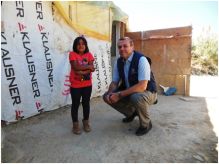 Dr Balladelli, WHO Regional Emergency Coordinator, with Marah, a Syrian refugee, at a refugee settlement in Tripoli, Lebanon14 October 2013 - Since the outbreak of the crisis, Lebanon has seen its population rise by nearly one third. For over two years Syria’s neighbours have struggled to cope with the protracted influx of Syrian refugees. According to the United Nations Office of the High Commissioner for Refugees (UNHCR) over 780 000 refugees, 76% of whom are women and children, have fled Syria into Lebanon.
Dr Balladelli, WHO Regional Emergency Coordinator, with Marah, a Syrian refugee, at a refugee settlement in Tripoli, Lebanon14 October 2013 - Since the outbreak of the crisis, Lebanon has seen its population rise by nearly one third. For over two years Syria’s neighbours have struggled to cope with the protracted influx of Syrian refugees. According to the United Nations Office of the High Commissioner for Refugees (UNHCR) over 780 000 refugees, 76% of whom are women and children, have fled Syria into Lebanon.
With the increasing number of refugees, local and governmental resources are being strained to unparalleled levels, especially the health sector. In Lebanon, as in all other host countries across the Region, Syrian refugees are in great need of health care, and both refugees and at-risk local populations suffer from poor access to quality health services. This is a major concern for WHO and health sector partners.
“We believe that access to quality health care should be secured for all. We have to ensure that the primary health care network is not only able to cope with those who can afford payment, but with Lebanese communities in need and Syrian refugees, who currently make up one third of the general population in Lebanon. Promoting an equitable approach to essential health services is critical for minimizing inter-community hostilities,” said Dr Pier Paolo Balladelli, WHO Regional Emergency Coordinator, who was in Lebanon to assess the humanitarian situation.
To try and relieve some of the burden on Lebanon’s health system, a number of United Nations agencies, both international nongovernmental organizations and national, have initiated programmes and interventions that directly support the Ministry of Public Health. International Medical Corps, Médicins Sans Frontières and Save the Children all manage a number of primary health care centres across the country, reducing the financial and human resource burden. Similarly, organizations, such as International Committee of the Red Cross, UNHCR, UNICEF and WHO technically and financially support primary health care centres, mental health and disability services, early warning systems, mother and child care, medications and vaccinations.
Vaccinations are key for the good health of Syrian refugees in Lebanon. Currently, there is significantly low immunization coverage among children 3 years and under. Priority health challenges also include the high prevalence of communicable and noncommunicable diseases, unwanted pregnancies, miscarriages and caesarean sections among the refugee population.
The situation for Syrian refugees in Lebanon is increasingly difficult. “My child has been vaccinated, but we had to pay” stated Hamila, talking about her 10-year-old daughter Marah. I want the best for my child. She used to go to school, but this year we were told it was full, so barring a miracle she will not receive any education.” Hamila and Marah live in a refugee settlement outside of Tripoli. Even though the location is described as ‘very good’ by local field health officers, this is only in comparison to other refugee settlements. In reality, Hamila and Marah live in a small tent, next to a rubbish dump.
Although the work of the Ministry of Public Health and other health sector partners continues unabated, gaps remain. The Government of Lebanon recently introduced free vaccination for measles and polio. Similarly, health care workers have grouped together to strategically plan further interventions, share critical information and combat the gaps that remain. With the imminent arrival of winter, the vulnerability of Syrian refugees and host communities will be heightened given their living conditions, the risk of respiratory infections and malnutrition.








